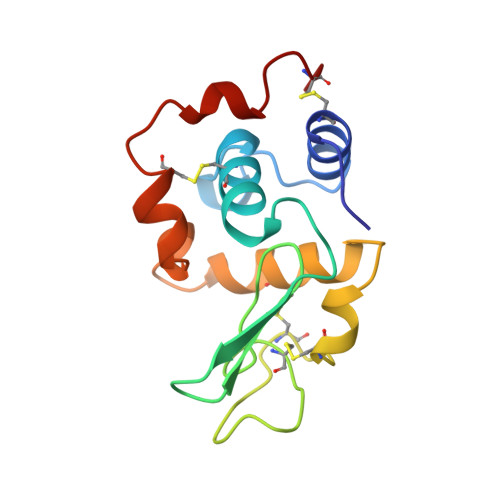Contribution of hydrogen bonds to the conformational stability of human lysozyme: calorimetry and X-ray analysis of six tyrosine --> phenylalanine mutants.
Yamagata, Y., Kubota, M., Sumikawa, Y., Funahashi, J., Takano, K., Fujii, S., Yutani, K.(1998) Biochemistry 37: 9355-9362
- PubMed: 9649316
- DOI: https://doi.org/10.1021/bi980431i
- Primary Citation of Related Structures:
1WQM, 1WQN, 1WQO, 1WQP, 1WQQ, 1WQR - PubMed Abstract:
The contribution of hydrogen bonds to the conformational stability of human lysozyme was investigated by the combination of calorimetric and X-ray analyses of six Tyr --> Phe mutants. Unfolding Delta G and unfolding Delta H values of the Tyr --> Phe mutant proteins were changed by from +0.3 to -4.0 kJ/mol and from 0 to -16 kJ/mol, respectively, compared to those of the wild-type protein. The net contribution of a hydrogen bond at a specific site to stability (Delta Gwild/HB), considering factors affected by substitutions, was evaluated on the basis of X-ray structures of the mutant proteins. In the present study, one of six mutant proteins was suitable for evaluating the strength of the hydrogen bond. Delta Gwild/HB for the intramolecular hydrogen bond at Tyr124 was evaluated to be 7.5 kJ/mol. Results of the analysis of other mutants also suggest that hydrogen bonds of the hydroxyl group of Tyr, including the hydrogen bond with a water molecule, contribute to the stabilization of the human lysozyme.
- Institute for Protein Research, Faculty of Pharmaceutical Sciences, Osaka University, Japan.
Organizational Affiliation:


















